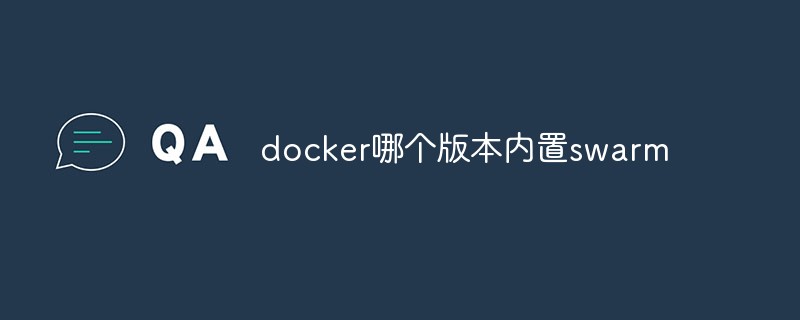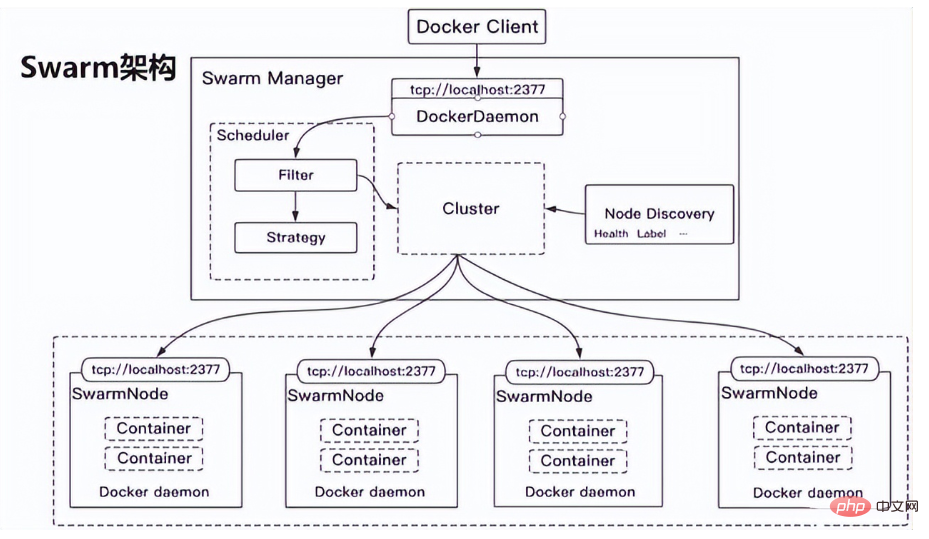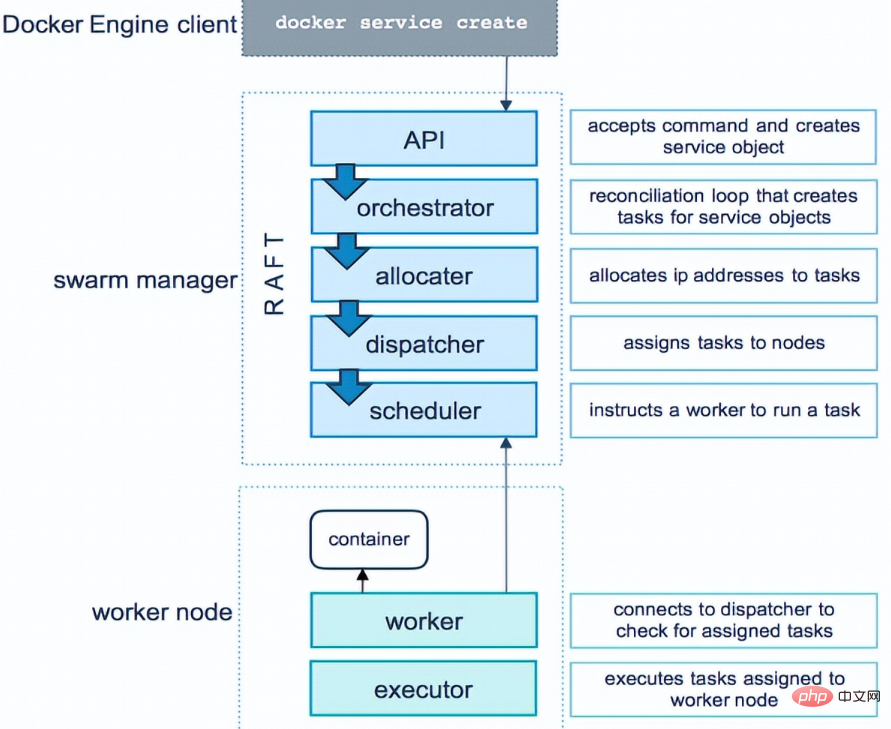Which version of docker has built-in swarm?
Starting from the "docker 1.12.0" version, swarm is built-in; swarm is a platform used to manage docker clusters. It is developed using the go language. Starting from the "1.12.0" version, "Docker Swarm" has included In the Docker engine, the service discovery tool is already built-in, so there is no need to configure Etcd or Consul for service discovery configuration.

The operating environment of this tutorial: linux7.3 system, docker version 19.03, Dell G3 computer.
Which version of docker has built-in swarm
Swarm is a platform launched by Docker to manage docker clusters. Almost all development is done in GO language
Docker Swarm and Docker Compose is the same as Docker's official container orchestration project, but the difference is that Docker Compose is a tool to create multiple containers on a single server or host, while Docker Swarm can create container cluster services on multiple servers or hosts. , for the deployment of microservices, obviously Docker Swarm will be more suitable.
Starting from Docker 1.12.0 version, Docker Swarm has been included in the Docker engine (docker swarm), and has built-in service discovery tools. We do not need to configure Etcd or Etcd as before. Consul is used for service discovery configuration.

As can be seen from the above figure, Swarm is a typical master-slave structure, which elects managers by discovering services. The manager is the central management node. Agents run on each node to accept the unified management of the manager. The cluster will automatically elect manager nodes in a distributed manner through the Raft protocol without the need for additional discovery service support, avoiding single-point bottlenecks. It also has built-in DNS. load balancing and integrated support for external load balancing mechanisms.
Extended knowledge
Docker Swarm working principle
1) Docker Engine client
docker service create: We use docker service create This command creates a service.
2) swarm manager
API: This request is received directly by the API of Swarm manager, receives the command and creates the service object.
orchestrator: Create a task for the service.
allocater: Assign an IP address to this task.
dispatcher: allocate tasks to specified nodes.
scheduler: Issue the specified command to the node.
3) Worker node: After receiving the manager task, run the task
container: Create the corresponding container.
worker: Connect to the scheduler to check the assigned tasks
executor: execute the tasks assigned to the worker node
Service: is a copy, which can be understood as a task , a task is a container.
swarm manager: It distributes this copy to three available work nodes.
container: The actual docker container to run the application.
task: The name of the work task is the service name followed by .1 and so on according to the number.

Recommended learning: "docker video tutorial"
The above is the detailed content of Which version of docker has built-in swarm?. For more information, please follow other related articles on the PHP Chinese website!

Hot AI Tools

Undresser.AI Undress
AI-powered app for creating realistic nude photos

AI Clothes Remover
Online AI tool for removing clothes from photos.

Undress AI Tool
Undress images for free

Clothoff.io
AI clothes remover

Video Face Swap
Swap faces in any video effortlessly with our completely free AI face swap tool!

Hot Article

Hot Tools

Notepad++7.3.1
Easy-to-use and free code editor

SublimeText3 Chinese version
Chinese version, very easy to use

Zend Studio 13.0.1
Powerful PHP integrated development environment

Dreamweaver CS6
Visual web development tools

SublimeText3 Mac version
God-level code editing software (SublimeText3)

Hot Topics
 1663
1663
 14
14
 1419
1419
 52
52
 1313
1313
 25
25
 1264
1264
 29
29
 1237
1237
 24
24
 How to exit the container by docker
Apr 15, 2025 pm 12:15 PM
How to exit the container by docker
Apr 15, 2025 pm 12:15 PM
Four ways to exit Docker container: Use Ctrl D in the container terminal Enter exit command in the container terminal Use docker stop <container_name> Command Use docker kill <container_name> command in the host terminal (force exit)
 How to copy files in docker to outside
Apr 15, 2025 pm 12:12 PM
How to copy files in docker to outside
Apr 15, 2025 pm 12:12 PM
Methods for copying files to external hosts in Docker: Use the docker cp command: Execute docker cp [Options] <Container Path> <Host Path>. Using data volumes: Create a directory on the host, and use the -v parameter to mount the directory into the container when creating the container to achieve bidirectional file synchronization.
 How to start containers by docker
Apr 15, 2025 pm 12:27 PM
How to start containers by docker
Apr 15, 2025 pm 12:27 PM
Docker container startup steps: Pull the container image: Run "docker pull [mirror name]". Create a container: Use "docker create [options] [mirror name] [commands and parameters]". Start the container: Execute "docker start [Container name or ID]". Check container status: Verify that the container is running with "docker ps".
 How to restart docker
Apr 15, 2025 pm 12:06 PM
How to restart docker
Apr 15, 2025 pm 12:06 PM
How to restart the Docker container: get the container ID (docker ps); stop the container (docker stop <container_id>); start the container (docker start <container_id>); verify that the restart is successful (docker ps). Other methods: Docker Compose (docker-compose restart) or Docker API (see Docker documentation).
 How to check the name of the docker container
Apr 15, 2025 pm 12:21 PM
How to check the name of the docker container
Apr 15, 2025 pm 12:21 PM
You can query the Docker container name by following the steps: List all containers (docker ps). Filter the container list (using the grep command). Gets the container name (located in the "NAMES" column).
 How to start mysql by docker
Apr 15, 2025 pm 12:09 PM
How to start mysql by docker
Apr 15, 2025 pm 12:09 PM
The process of starting MySQL in Docker consists of the following steps: Pull the MySQL image to create and start the container, set the root user password, and map the port verification connection Create the database and the user grants all permissions to the database
 How to view logs from docker
Apr 15, 2025 pm 12:24 PM
How to view logs from docker
Apr 15, 2025 pm 12:24 PM
The methods to view Docker logs include: using the docker logs command, for example: docker logs CONTAINER_NAME Use the docker exec command to run /bin/sh and view the log file, for example: docker exec -it CONTAINER_NAME /bin/sh ; cat /var/log/CONTAINER_NAME.log Use the docker-compose logs command of Docker Compose, for example: docker-compose -f docker-com
 How to create containers for docker
Apr 15, 2025 pm 12:18 PM
How to create containers for docker
Apr 15, 2025 pm 12:18 PM
Create a container in Docker: 1. Pull the image: docker pull [mirror name] 2. Create a container: docker run [Options] [mirror name] [Command] 3. Start the container: docker start [Container name]




